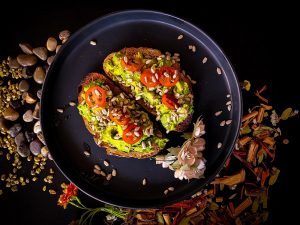To make a quality rub or sauce, follow these steps and you’ll be well on your way to making BBQ magic:
Use real ingredients — not powdered substitutes.
Use the freshest ingredients available.
Store spices and herbs in airtight containers and keep those containers in a cool, dry place.
Always use the freshest spices possible. Buy smaller amounts more often, rather than large quantities that sit around for months in the pantry.
When adding any liquid ingredient to a rub or sauce, bring it to room temperature before adding it to the dry ingredients. This will prevent the rub from becoming lumpy.
1. Use fresh spices and herbs. The quality of your rubs and sauces is directly dependent on the ingredients you use. If you purchase dried spices or herbs, then be sure to taste them before using them in your rubs or sauces. Dried spices lose their potency over time, especially if they are exposed to light and air. Some companies will also use older, low quality spices to keep prices down.
2. Use fresh peppers when possible. Many people make their own hot sauce with dried chile peppers because they are convenient and easy to find all year around. But dried chiles can be hard to find in high quality, especially in most grocery stores. Fresh peppers are usually better tasting and more flavorful than their dried counterparts when used whole or chopped up in a rub or sauce. Plus fresh peppers are easy to find at the grocery store during summer time when they are in season.
3. Taste as you go along, then adjust the seasonings as needed. I’m a big advocate of tasting as you cook, so that’s why I always recommend tasting any rub or sauce before putting it on the meat, then adjust it as needed until it tastes just right.
4. Store extra rubs and sauces in airtight containers and jars to maintain flavor
If you’re buying bottled BBQ sauces and rubs, you’re missing out. Learn to make your own and you’ll be able to customize them for each type of meat and smoke session. Here are five tips that will help you get there.
Making your own rubs is easy! The basic formula is:
sugar + salt + chili powder + other spices = dry rub
You can adjust the proportions of each ingredient as desired. If you want to play with the variety of spices, start with small batches until you find a combination that suits your taste buds.
When it comes to sauces, the options are just as limitless. The following are a few key things to keep in mind when building your own sauces:
1. Use high quality ingredients
2. Balance flavors – sweet, tangy, bitter, spicy…
3. Add layers of flavor by slowly cooking aromatics like onions, garlic, celery or even fruit before adding additional ingredients
4. Simmer for at least an hour to let the flavors mingle and develop depth
5. For a thicker consistency, add corn starch or flour during the last 10 minutes of simmering
BBQ rubs and sauces have become an art form all their own. A good rub can make a simple piece of meat taste great, while the perfect sauce can take the best cut to a new level. But there are plenty of ways to get it wrong. Here’s how to ensure you’re on the right track.
1) Rubs are simple
You don’t need a lot of ingredients or time to make a great BBQ rub. A few simple spices and herbs can go a long way on a rack of ribs or a brisket. And with just five minutes of prep time and ten minutes in the oven, you’ll be ready to eat.
2) Sauces are more complex
A BBQ sauce is more than just ketchup mixed with some spices and sugar (though that will do in a pinch). There’s no single recipe for making an authentic barbecue sauce, but there are some key things you should know before getting started.
3) Don’t over-complicate your rubs
If you add too many ingredients, your meat might not cook evenly, and the flavors won’t meld together as well as they could. Stick with two or three spices that complement each other, like salt and pepper, or cumin and paprika. If
1. Heat rubs and sauces are made with chilies and chili powders that can range from mild to fiery hot. If you want to get a real taste of the chilies, then use a pepper mill to grind them. This is a quick and easy way to add freshly ground chili powder to your rubs or sauces.
2. A lot of people use sugar in their dry rubs and sauces but sugar can burn easily so be careful when using it in your recipes. Sugar will work best if you add it near the end of the grilling process or in the last few minutes.
3. When using a rub, be sure to apply it about an hour before cooking so that the flavors can soak into your meat, poultry or seafood prior to cooking.
4. When making a sauce, start with less vinegar and add more to taste as needed for the right balance of sweet and sour flavors.
5. Tomato pastes are a good way to thicken up your sauce but they can often taste tart so be sure to add some sweetness if needed with brown sugar, molasses or honey.
Pitmasters from across the country share their recipes for success. Here are five tips for creating your own rubs and sauces.
Barbecue is a very personal thing. Your choice of meat, sauce, and cooking method are all part of what makes your barbecue unique. So why not take it one step further and make your own rubs?
Rubs add flavor to your meat without adding moisture. Sauces add flavor to the surface of the finished product. Rubs are generally applied before cooking and sauces after cooking is complete. Most pitmasters have a few rub recipes they have perfected over time, and they usually have a sauce or two they like to use as well.
Here are some great tips for making your own rubs and sauces:
1. Heat and Time
This is the single most important factor in getting flavor out of your ingredients. If you have time, go ahead and roast your garlic, onion, chilies, and peppers before adding them to your rub. If you don’t have time, at least saute the onion and garlic in a little olive oil until they are translucent. You will be surprised how much better it will taste.
2. Savory Rubs
For a savory rub, avoid sweeteners all together or use them sparingly. A good savory rub will have a balance of saltiness and spiciness with a little acidity. A typical “Kansas City” style barbecue rub will have sugar as the sweetener, but I prefer honey for two reasons: It is sweeter than sugar so you can use less of it and it does not crystallize when it hits high heat like sugar does (think of burnt sugar on the bottom of a pot).
3. Sweet Rubs
On the other hand, if you want to make a sweet barbecue rub for ribs or chicken, use sugar as the primary sweetener because it does not burn as easily as honey which can give your meat an unpleasant charred taste if applied too liberally or

